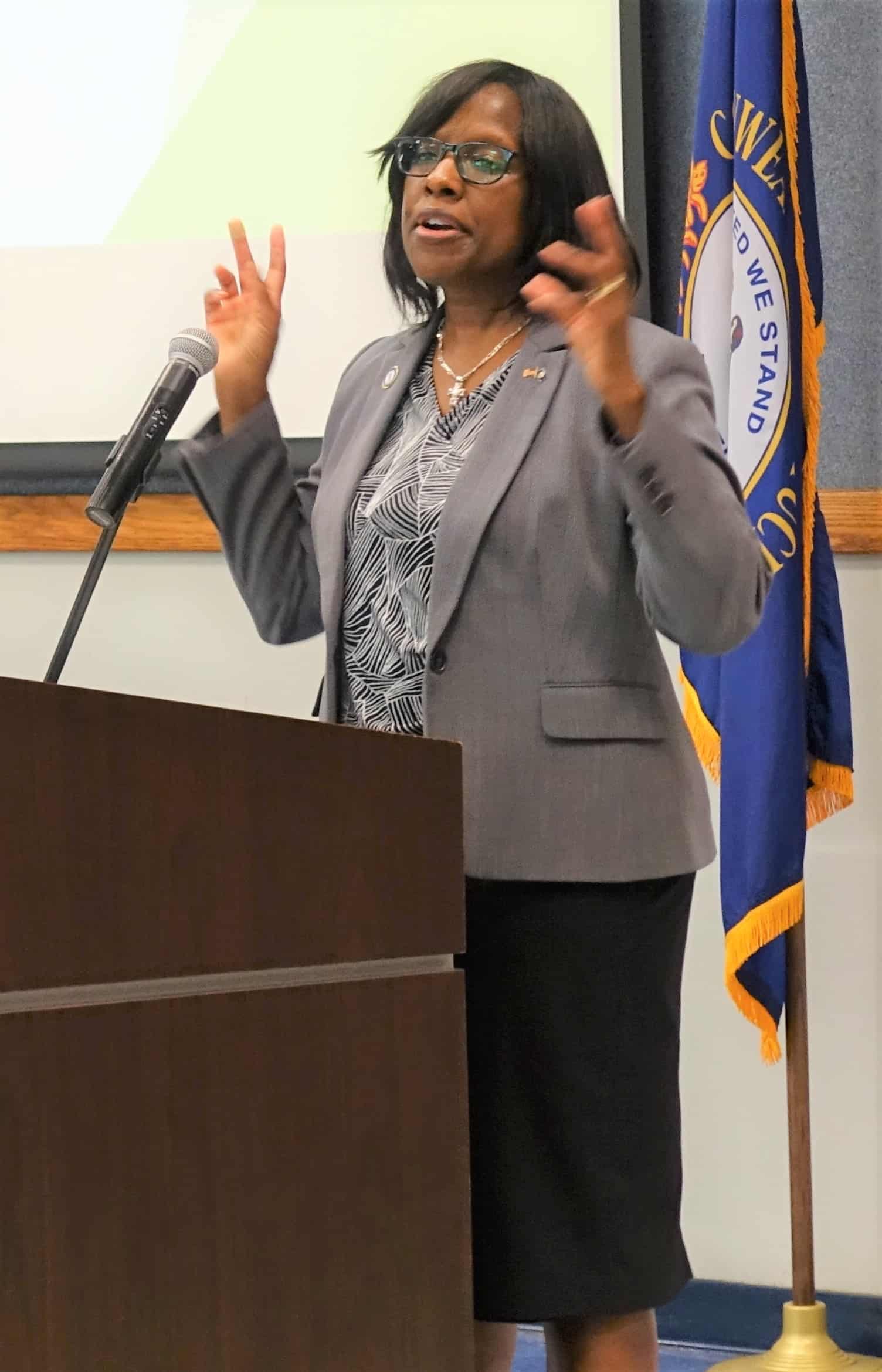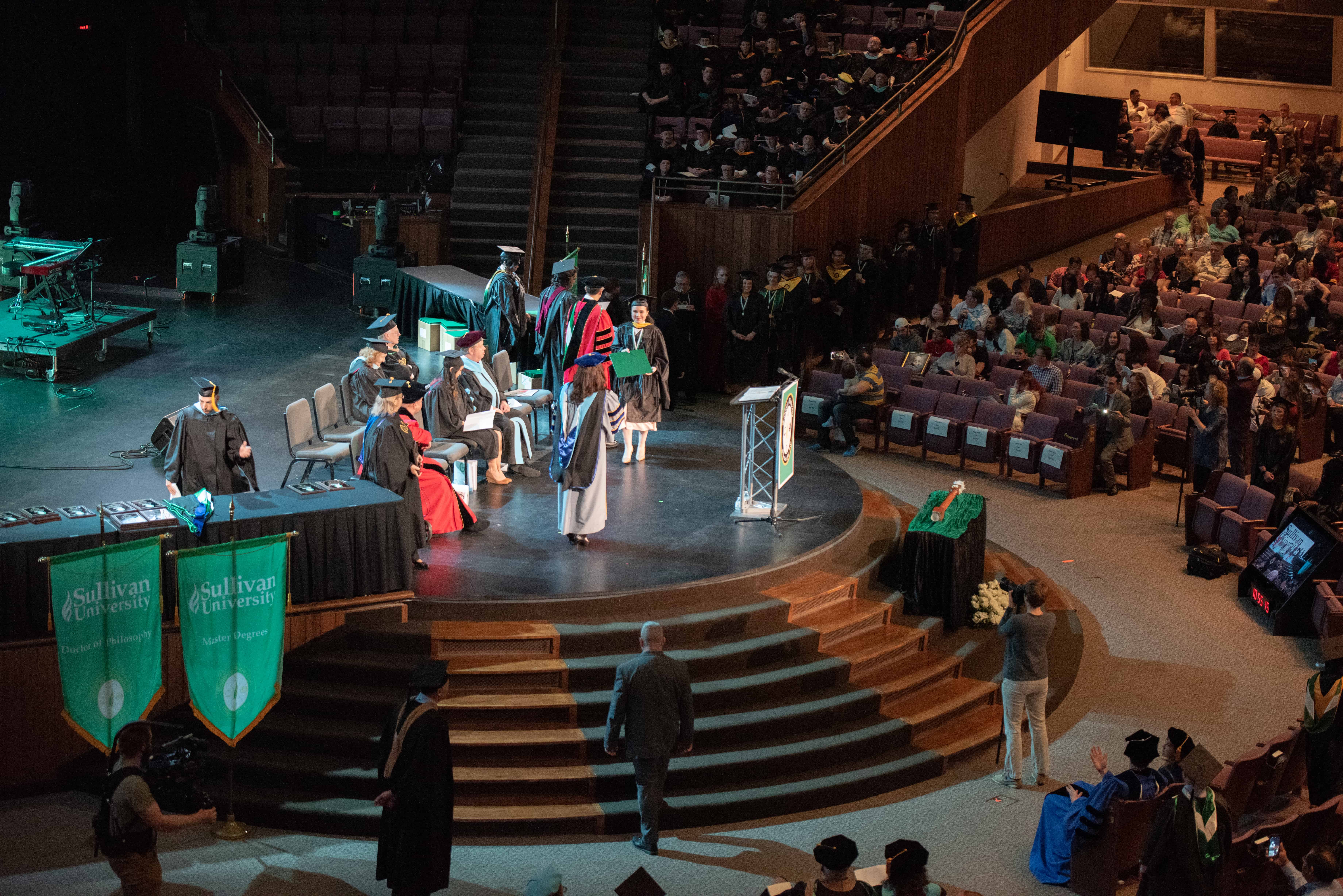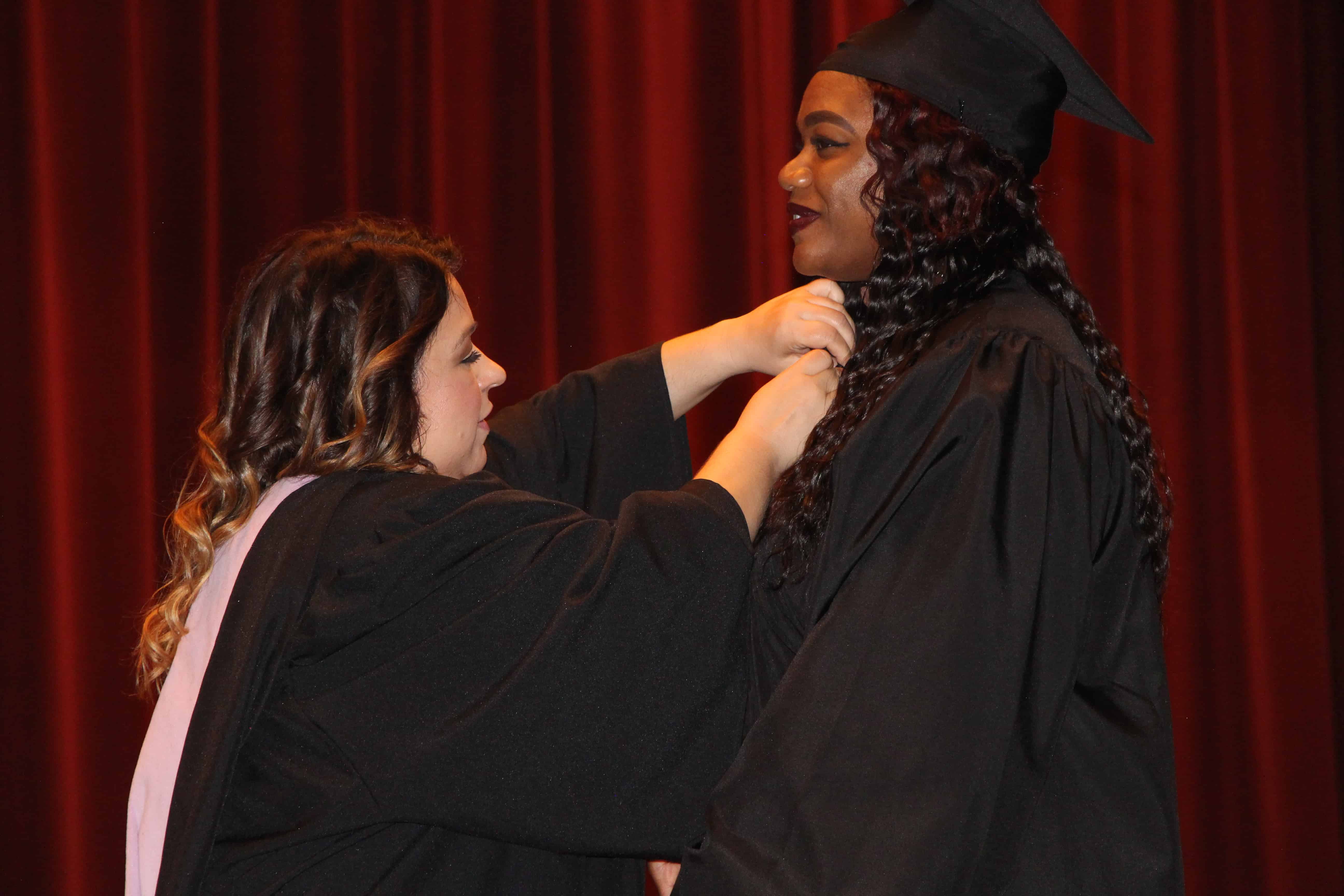
Please review for more information about how your college or school can help KACCS preserve and protect the rights of Veterans and Active Military seeking career and vocational training at proprietary institutions.

An Innovative Campus and Bistro
NORTH RICHLAND HILLS, Texas—A public school in this Dallas suburb takes hands-on learning to another level.
Students draw blood from teachers to practice phlebotomy. They serve the public as tellers at a campus-based credit union and in a bistro with an omelet station.
In a former roller rink turned barn, students tend to farm animals, including 500-pound steers, while learning about cuts of meat in class. “If I got hired at a family restaurant, I’d know what to do,” said 16-year-old Casey Heinz after a lesson on cooking different types of beef.
The Birdville Center of Technology and Advanced Learning, a $16.75 million campus focused on careers, is what school districts around the country are striving to achieve as more focus shifts to graduates who are skipping college and going right into the workforce. . .
. . . In another area, students wearing smocks check vital signs of patient mannequins. They also spend time at a local hospital working with real patients, such as helping feed them and checking blood pressure. Students who learn in the school’s mock pharmacy also practice in real ones in the area as interns, opening a pipeline for paid work. “They call us every year for pharmacy techs,” teacher Sharon Leon said, adding that students who receive their pharmacy technician certification are workforce ready.
(Read more at WSJ, 6.3.2019, Tawnell D. Hobbs)
… and pride in completion! From the Spring 2019 Sullivan University graduation ceremony. For more information, go to www.sullivan.edu.



… to join the premiere Career College association in the Commonwealth of Kentucky. Join now and gain “member” status when you register for the 2019 Conference and Exhibition, “Navigating change through innovation.”
The new address for the Kentucky Association of Career Colleges and Schools, effective immediately:
291 N. Hubbards Lane, Suite 172-243 | Louisville, KY 40207
By Cindy Landry, President
Persistent and detrimental gaps between the skills profile of available workers and the skills profile sought by employers continue to suppress the economic vitality of communities in every sector across the U.S., including manufacturing. (“Skills Gap and Future of Work,” 2018 Study by Deloitte & The Manufacturing Institute). The problem is vexing: in spite of its high profile, the sectors and institutions – public and private – with the resources and expertise to close the gap have fallen short of making substantial impact. “Gap closing” requires diligence, collaboration, coordination and sophistication. And it requires all relevant actors, working in synch, to lower the barriers to comprehensive and effective skills development. The skills gap will remain significant until and unless all post-secondary sectors are contributing capacity to its mitigation through the delivery of work-ready education.
Among the demographic sub-sets most beset by the skills gap are veterans and military personnel pursuing economic opportunity in the civilian sector. Technical and teamwork aptitudes that are honed in the armed services must be harnessed to enhanced communications, human relations, critical thinking and marketplace awareness skills required by civilian employers. Career colleges and schools offer programs in professional, occupational and technical fields that bring together military readiness and contemporary work-ready education. Proprietary education is focused on flexible time, place and mode of instruction delivery to accommodate working adults. Further, the sector’s colleges and schools enlist faculty and support staff with direct, current knowledge of the contemporary workplace. The institutions thrive when students engage and complete career education in a timely, successful manner.
How well do proprietary colleges and schools serve veterans? Gallup Research recently conducted a national Student Satisfaction survey of private career colleges and schools and found that 76% of veterans said their degree/certificate was directly related to their work; 71% said they were satisfied with their education; 63% said they would recommend their institution to a fellow Veteran, friend or family member; Veterans experienced a 39% increase in their annual income compared to their income before attending our schools.
Furthermore, a joint study by Student Veterans of America revealed that student veterans at private career colleges and schools are succeeding at levels comparable to, if not greater than, their peers elsewhere. Other recent and recurring research underscores the value of career and skills-formation education in terms of enhanced earnings and sustainable full-time employment, compared to individuals who opt out of attaining non-degree credentials. (“Non-Degree Credentials Boost Employment and Life Outcomes,” Rhea Kelly, May 2019, Campus Technology.)
Unfortunately, proposals to marginalize or eliminate veteran participation in proprietary education are part of legislation that is under consideration by the U.S. House of Representatives. Provisions in Higher Education Reauthorization would modify the 90/10 ratio (federal funds/non-federal funds) and apply Veteran’s education benefits as well as tuition assistance for active military to the “federal funds” side of the ratio. Those restrictions constitute substantial disincentives for current and former military to enroll at proprietary colleges or schools, regardless of the institution’s programs, their fit with the needs of the student, or the institution’s effectiveness. The broad-brush proposal will greatly impede the ability of an important work-ready resource to be applied toward shrinking the skills gap.
In the Commonwealth of Kentucky, the risk of these potential changes in federal education policy threaten choice and access by thousands of students, and imperil the financial viability of dozens of small, privately-owned and operated career colleges that have been faithfully and effectively serving more than 30 Kentucky communities for more than a century.
The demographics of students enrolled at career colleges in Kentucky spans the full spectrum of diversity, with strong participation by women, minorities, veterans and individuals from low-income and disadvantaged backgrounds. They have access to programs that align and respond to workforce gaps.
The geographic reach of KACCS member institutions, coupled with their relevant programming, outstanding student services and adult-learner-friendly operation makes them valuable resources to the commonwealth’s initiatives to close skills gaps. The performance, longevity and persistent engagement with the workforce development community magnifies their impact and effectiveness.
Federal and state policies that acknowledge the valuable resource of the career college sector and promote its full participation are meritorious and worthy of celebration. Efforts to marginalize the Kentucky proprietary education through constrictions to federal policy undermine best efforts to develop a work-ready labor pool, and unfairly diminish education options for men and women in uniform and their discharged cohorts.
Congress is well advised to delete these provisions from HEA legislation that moves to the floor of either chamber. Closing the skills gap through abundance in work-ready education depends on it.

More than 100 family members, friends and supporters turned out May 17 in Louisville to honor the 2019 graduates of the MedQuest dental assisting, medical assisting and medical billing and coding programs. Congratulations to the MedQuest Class of 2019! For more information go to https://medquestcollege.edu/
Electronic Announcement #119 – Release of the 2019 GE Disclosure Template is now available on the IFAP Federal Student Financial Aid website. All institutions with programs subject to the GE regulations have until July 1, 2019 to update disclosures for each relevant program on the 2019 GE Disclosure Template and post the disclosures to the program webpage. The new 2019 GE Disclosure Template is more simplistic and straightforward, providing data and information that the Department asserts is the most meaningful to students. Details? Go to:
https://www2.ed.gov/about/offices/list/ope/ge-template.html
https://ope.ed.gov/GainfulEmployment/
“Solutions that could better-support existing borrowers, as well as reforms to improve the system…”
Americans currently hold $1.5 trillion in outstanding federal student loan debt, with nearly one in five adults carrying a share of this burden. Less than half of new borrowers can put a dent in their principal balance within three years of entering repayment. Worse yet, some traditionally under-served populations carry disproportionately large debt burdens and are more likely to default. With reauthorization of the Higher Education Act on the horizon, now is the time to consider reforms. Sponsored by the Bipartisan Policy Center, the Aspen Institute Financial Security Program, and the Consumer Bankers Association. as we explore solutions that could better-support existing borrowers, as well as reforms to improve the system moving forward. Click the link to recent panel discussion at BPC!
Sullivan University — home to the College of Hospitality Studies — is again ranked as one of the best culinary schools in the United States.
Sullivan was ranked 10th in a listing of the country’s top culinary schools by University Magazine, which used U.S. Department of Education data to compile the rankings, according to a Sullivan press release. Go to https://sullivan.edu/uncategorized/sullivan-university-named-one-of-americas-best-culinary-schools/
Next meeting of the Kentucky Commission for Proprietary Education has been re-scheduled for Thursday, June 27 in Frankfort. For more details, go to http://kcpe.ky.gov/.
To better prepare students for jobs, new groups and companies are emerging to help connect what employers want and colleges offer. …Colleges and universities are pushing to keep up with the … demand for more and different kinds of education and training. But they’re not working alone. Employers, which have scaled back their investments in employee education in recent years, are again seeing a need to be involved in that upskilling. Yet studies repeatedly show that business leaders are often at odds with colleges and students as to whether graduates are adequately prepared for the workforce.
“Employers literally want to see that (graduates) have the skills they’re looking for so (they) can be productive in that job on day one,” said Ryan Craig. “That’s hard and that requires a set of new and different initiatives.” Postsecondary institutions have the potential to be a “revolving door” through which students come and go as they need to re-up their qualifications … which include critical thinking, problem-solving, teamwork, writing, oral communication and data analytics.
Excerpts from Hallie Busta, Education Dive, 5.2.19 https://www.educationdive.com/news/understanding-higher-eds-role-in-workforce-education-partnerships/553914/ cked0 List T

In this edition: Legislative Wrap-Up; Congress considers reauthorization of the Higher Education Act (HEA); News & Alerts; Calendar.
Navigating change through innovation.
Friday, August 9, 2019 | 8:30 a.m. to 4:00 p.m. (EST) | Louisville, KY
Inquiries? Contact KACCScontact@gmail.com